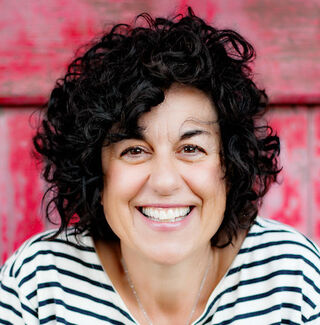Friends
It's Never Too Late to Say No
At age 59, author Ann Garvin finally learned to say no to second dates.
Posted April 20, 2021 Reviewed by Lybi Ma

By Ann Garvin
Last year I went on a second date with a nice man I wasn't interested in. If I'm honest, I've done this quite a lot. On the surface, it isn't a horrible practice. I think it shows I have an understanding that people, like books or movies, might need a few pages or scenes to get into. That immediate chemistry can be misleading and not everyone is their best self if they're nervous.
The first date went like this:
Me: "Hi Markus. Tell me about yourself."
Three hours later I knew that Markus loved the color purple, went on long road trips with his dad, ate Mexican food four times a week, had been married twice, loved running, and was allergic to pineapple. If Markus asked me a question it was so that he could answer it with a long story about himself, about how much he loved teaching Spanish and how his favorite running shoes, New Balance, were shoes I should get. He had a coupon. Just wait. He'll get it on his phone while he talked about Aztec art.
"I don't run," I tried to tell him.
"Just in case we start running together," he said. "You'll love them. My house is next to running trails. We can go for morning runs."
I knew right away I didn't want to see him again but I agreed to another date anyway.
I know there are a lot of women who would have snuck out the back on that first date and left him wondering where his running partner went. Or just asked him, flat out why he’s like a radio that can't be turned off, instead of a person interested in another person.
When asked out again I know that some women would just say, "Oof, God no." But at the end of the night when Markus said, "Let's go for a walk Thursday,” I said yes.
Suffice to say that many people in the world will be amazed that I have trouble with this. I am amazed that I have trouble with this. I'm tough with my students, collaborative with colleagues, honest with friends. I would even go so far as saying if you met me, you would be shocked that I don't just say, "No thanks."
I’m fifty-nine. I should know how to do this by now. I don't want to unpack my maybe-generational, maybe-conflict-avoidant, perhaps patriarchal upbringing to get to the useful part of this essay. If you can't say no to dates, bake sales, carpools, or committees, I think my therapist's advice will help you.
Yes, I went to a therapist.
Here's how it went:
"How do I tell this nice person that I don't want to go out with him again," I said.
My therapist calmly replied, "Just call him."
"And say what?"
"’This connection isn't the connection I was looking for. Be well.’" She said this without hesitation.
"What do I say when he asks why?"
"Say, ‘Because I don't want to’. Or, repeat, ‘This isn't the connection I was looking for’."
"Don't I owe him an explanation?
“No,” she said and then we had a conversation about boundaries and I thought, this is what they should teach in high school and stop hammering home isosceles triangles.
I hung up because It couldn’t be that easy. I asked my daughters who are twenty-one and twenty-three and both of them said the same thing. Before calling Marcus, I visualized the conversation and realized that it was his reaction I was worried about. In the negotiating part of the conversation, women my age have spent a lifetime navigating with partners of all kinds.
"What if he gets mad?" I asked.
"Just say, ‘Okay,’ and hang up."
"But I said I would go."
"You are allowed to change your mind."
"I think it's going to hurt his feelings."
"You are not responsible for his feelings."
There’s no time, in this little space, to explore women and our inherent caregiving, community-loving, we-are-the-world attitudes in life: the inherent whys of having trouble saying no. Besides, I think you just want to know how it went when I canceled my second date with Markus.
I took a deep breath and dialed Markus's number.
He answered and launched into a description of his morning run and how fun it will be when he and I run together.
I said, "Hey, I'm calling to cancel our Thursday walk. This connection isn't the connection I'm looking for." I said it nicely, not as robotic as it sounds here.
He said, "I thought we had a great connection. Was it something I said?"
"I don't think we're right for each other," I said.
“I don’t understand,” he said irritated and hung up.
During the call, there was awkwardness and silence that I didn't fill with apologies or explanations. Was I sweaty? Yes. Did my heart bounce all over the place with nerves? Yes. Yes, it did. But, after I hung up I felt pretty good, a little unsettled, and definitely relieved.
Did this exercise cure me? Am I able to say, no more easily now? Yes and no.
Markus let me off easily but others responded in the way that I was most afraid of. One guy got epically angry and went on a tirade. One guy stalked me for six months, and I had to call the police and put in security cameras. One guy still texts me once a month to see if I've changed my mind: is no really no?
I realized that it's not the no that's hard, it's the reaction to the no that is difficult. Giving me the words helped me when the unhealthy responses came at me. I didn’t falter, explain, or have conversations I didn’t want to have. Providing the words underpinned what I can control and what I cannot, what is my responsibility and what is not.
Why did it take me so long to learn this? I'm still talking to my therapist about that.
Am I still going on dates? No, because it's not the connection I am looking for.
Ann Garvin is the bestselling author of four novels, including I thought You Said This Would Work. She is the founder of the Tall Poppy Writers where she is committed to helping writers succeed.




